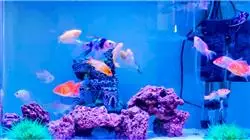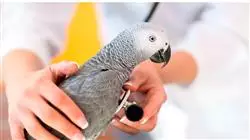University certificate
The world's largest faculty of veterinary medicine”
Introduction to the Program
Veterinarians specializing in Birds, Wildlife and Fish are increasingly in demand. Don't think twice and improve your skills in this area"

The Postgraduate Diploma in Birds, Wildlife and Fish is a high quality training program that focuses on the study of the main pathologies, diagnostic techniques and treatments in this type of animals to provide high-level training to veterinarians who want to specialize in this field.
Keeping wild birds or birds from breeding farms is a common fact nowadays that the veterinary professional must face in the daily clinical practice, for this reason it is necessary to understand the anatomical, physiological and ethological differences in conventional pets at home and between avian species in order to approach the patient correctly.
The need to visit a specialist in birds is generally for two specific reasons: when the bird has just been acquired for a routine check-up, deworming, comment on contagious diseases and take appropriate preventive measures; and when the bird has any pathology.
The management of the decompensated avian patient in the clinic needs to be fast and efficient, taking into account the appropriate instrumentation. In addition, its origin must be taken into account, either to consider it as a possible transmitter of zoonotic diseases, or to evaluate its possible reinsertion into the wild if it is a possible wild bird.
On the other hand, this Postgraduate Diploma will also delve into the medicine and surgery of wild animals, focusing on veterinarians working in zoos, aquariums, rescue centers, confiscation centers and rehabilitation centers, among others.
The veterinarian specialized in this type of animals must be qualified to develop all the rescue tasks, clinical care and reception of the animal, diagnostic techniques and interpretation of results, as well as the application of updated medical and surgical treatments that will be developed throughout this module.
Finally, it should be noted that the ornamental fish clinic is largely unknown to the vast majority of clinical veterinarians, yet there is a high awareness of responsibility in their care. As a consequence, the clinical veterinarian today is forced to perform a high level of specialization in these species. Specifically, this Postgraduate Diploma focuses on ornamental fish, fish for animal feed and laboratory fish.
Being an online diploma, the student is not constrained by fixed schedules or the need to move to another physical location, but can access the contents at any time of the day, balancing their work or personal life with their academic life as they wish.
Train with us and learn how to diagnose diseases of Birds, Wildlife and Fish"
This Postgraduate diploma in Birds, Wildlife and Fish contains the most complete and up-to-date educational program on the market. The most important features of the program include:
- Practical cases presented by experts in birds, wildlife and fish
- The graphic, schematic, and eminently practical contents with which they are created provide scientific and practical information on the disciplines that are essential for professional practice
- The latest news on the diagnosis and treatment of diseases in birds, wildlife and fish
- Practical exercises where the self-assessment process can be carried out to improve learning
- A special emphasis on innovative methodologies in the field of the diagnosis and treatment of diseases in birds, wildlife and fish
- Theoretical lessons, questions to the expert, debate forums on controversial topics, and individual reflection assignments
- Content that is accessible from any fixed or portable device with an Internet connection
Do not miss the opportunity to do this Postgraduate Diploma in Birds, Wildlife and Fish with us. It's the perfect opportunity to advance your career"
Its teaching staff includes professionals from the veterinary field, who bring the experience of their work to this training, as well as recognised specialists from leading societies and prestigious universities.
The multimedia content, developed with the latest educational technology, will provide the professional with situated and contextual learning, i.e., a simulated environment that will provide immersive training programmed to train in real situations.
This program is designed around Problem Based Learning, whereby the specialist must try to solve the different professional practice situations that arise during the academic year. For this purpose, the professional will be assisted by an innovative interactive video system created by renowned and experienced experts in Birds, Wildlife and Fish.
This Postgraduate Diploma is the best investment you can make in selecting a refresher program to update your knowledge in Birds, Wildlife and Fish"

This training comes with the best didactic material, providing you with a contextual approach that will facilitate your learning"
Why study at TECH?
TECH is the world’s largest online university. With an impressive catalog of more than 14,000 university programs available in 11 languages, it is positioned as a leader in employability, with a 99% job placement rate. In addition, it relies on an enormous faculty of more than 6,000 professors of the highest international renown.

Study at the world's largest online university and guarantee your professional success. The future starts at TECH”
The world’s best online university according to FORBES
The prestigious Forbes magazine, specialized in business and finance, has highlighted TECH as “the world's best online university” This is what they have recently stated in an article in their digital edition in which they echo the success story of this institution, “thanks to the academic offer it provides, the selection of its teaching staff, and an innovative learning method aimed at educating the professionals of the future”
A revolutionary study method, a cutting-edge faculty and a practical focus: the key to TECH's success.
The most complete study plans on the university scene
TECH offers the most complete study plans on the university scene, with syllabuses that cover fundamental concepts and, at the same time, the main scientific advances in their specific scientific areas. In addition, these programs are continuously being updated to guarantee students the academic vanguard and the most in-demand professional skills. In this way, the university's qualifications provide its graduates with a significant advantage to propel their careers to success.
TECH offers the most comprehensive and intensive study plans on the current university scene.
A world-class teaching staff
TECH's teaching staff is made up of more than 6,000 professors with the highest international recognition. Professors, researchers and top executives of multinational companies, including Isaiah Covington, performance coach of the Boston Celtics; Magda Romanska, principal investigator at Harvard MetaLAB; Ignacio Wistumba, chairman of the department of translational molecular pathology at MD Anderson Cancer Center; and D.W. Pine, creative director of TIME magazine, among others.
Internationally renowned experts, specialized in different branches of Health, Technology, Communication and Business, form part of the TECH faculty.
A unique learning method
TECH is the first university to use Relearning in all its programs. It is the best online learning methodology, accredited with international teaching quality certifications, provided by prestigious educational agencies. In addition, this disruptive educational model is complemented with the “Case Method”, thereby setting up a unique online teaching strategy. Innovative teaching resources are also implemented, including detailed videos, infographics and interactive summaries.
TECH combines Relearning and the Case Method in all its university programs to guarantee excellent theoretical and practical learning, studying whenever and wherever you want.
The world's largest online university
TECH is the world’s largest online university. We are the largest educational institution, with the best and widest online educational catalog, one hundred percent online and covering the vast majority of areas of knowledge. We offer a large selection of our own degrees and accredited online undergraduate and postgraduate degrees. In total, more than 14,000 university degrees, in eleven different languages, make us the largest educational largest in the world.
TECH has the world's most extensive catalog of academic and official programs, available in more than 11 languages.
Google Premier Partner
The American technology giant has awarded TECH the Google Google Premier Partner badge. This award, which is only available to 3% of the world's companies, highlights the efficient, flexible and tailored experience that this university provides to students. The recognition as a Google Premier Partner not only accredits the maximum rigor, performance and investment in TECH's digital infrastructures, but also places this university as one of the world's leading technology companies.
Google has positioned TECH in the top 3% of the world's most important technology companies by awarding it its Google Premier Partner badge.
The official online university of the NBA
TECH is the official online university of the NBA. Thanks to our agreement with the biggest league in basketball, we offer our students exclusive university programs, as well as a wide variety of educational resources focused on the business of the league and other areas of the sports industry. Each program is made up of a uniquely designed syllabus and features exceptional guest hosts: professionals with a distinguished sports background who will offer their expertise on the most relevant topics.
TECH has been selected by the NBA, the world's top basketball league, as its official online university.
The top-rated university by its students
Students have positioned TECH as the world's top-rated university on the main review websites, with a highest rating of 4.9 out of 5, obtained from more than 1,000 reviews. These results consolidate TECH as the benchmark university institution at an international level, reflecting the excellence and positive impact of its educational model.” reflecting the excellence and positive impact of its educational model.”
TECH is the world’s top-rated university by its students.
Leaders in employability
TECH has managed to become the leading university in employability. 99% of its students obtain jobs in the academic field they have studied, within one year of completing any of the university's programs. A similar number achieve immediate career enhancement. All this thanks to a study methodology that bases its effectiveness on the acquisition of practical skills, which are absolutely necessary for professional development.
99% of TECH graduates find a job within a year of completing their studies.
Postgraduate Diploma in Birds, Wildlife and Fish
.
Dive into the fascinating world of birds, wildlife and fish with our online Postgraduate Diploma in Birds, Wildlife and Fish program. At TECH Global University, we offer you the opportunity to acquire specialized knowledge in this exciting field, providing you with the necessary tools to become an expert in the conservation and care of these species. Our University program is perfect for nature lovers and professionals who wish to expand their knowledge in the management and conservation of these species. Through a practical and theoretical approach, you will explore the diversity of birds, wildlife and fish, their biological characteristics, behavior and natural habitats.
Enroll now and start in online mode
.
At TECH Global University, we are proud to offer a high-quality online educational experience. Our program combines interactive virtual classes, multimedia resources and practical activities that will allow you to apply your knowledge in real situations. In addition, you will be supported by a team of expert teachers who will guide you throughout the learning process. As a student of this Postgraduate Diploma, you will have the opportunity to explore the latest research and techniques in the field of bird conservation. You will learn about the importance of their preservation, the challenges they face today, and the management and rehabilitation strategies needed to ensure their survival. Once you complete the program, you will be prepared to work in areas related to wildlife conservation, such as nature reserves, zoos, research centers and organizations dedicated to the protection of species. In addition, you will have the foundation necessary to undertake independent research projects and promote environmental awareness in your community. Don't miss the opportunity to become an expert in birds, wildlife and fish! Join TECH Global University and begin your path to an exciting career in biodiversity conservation - enroll in our Postgraduate Diploma in Birds, Wildlife and Fish program today!







